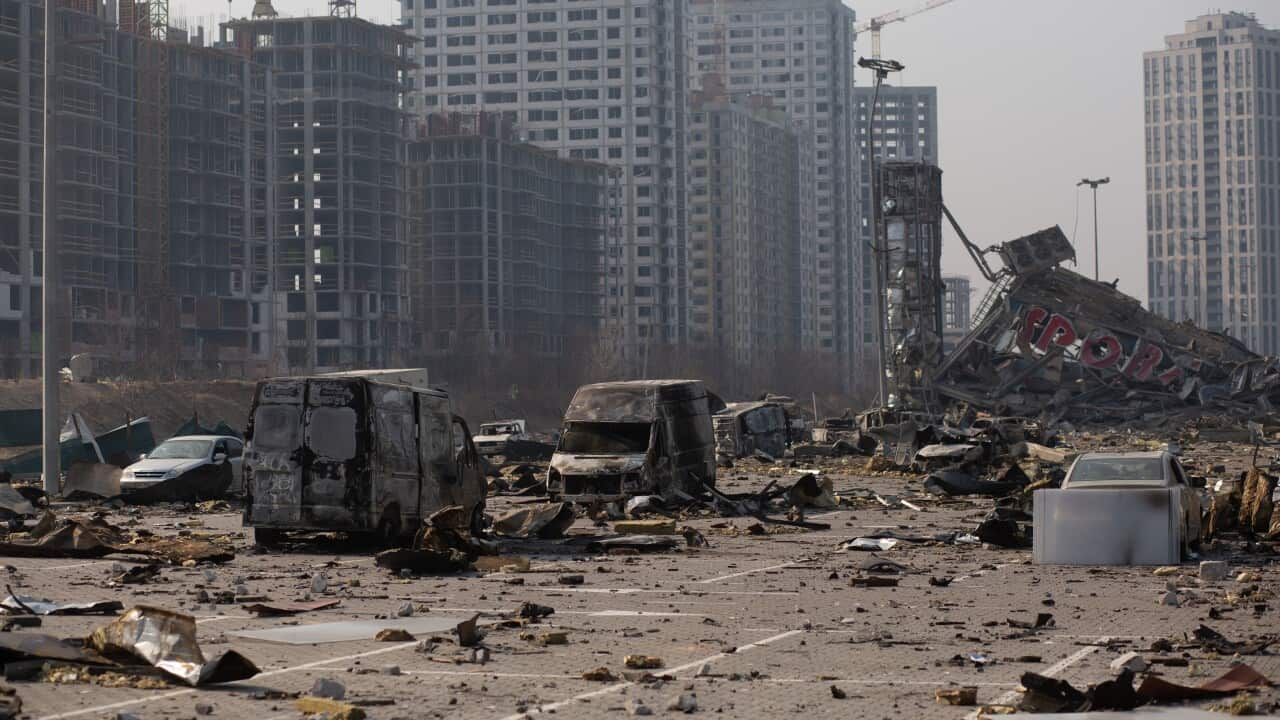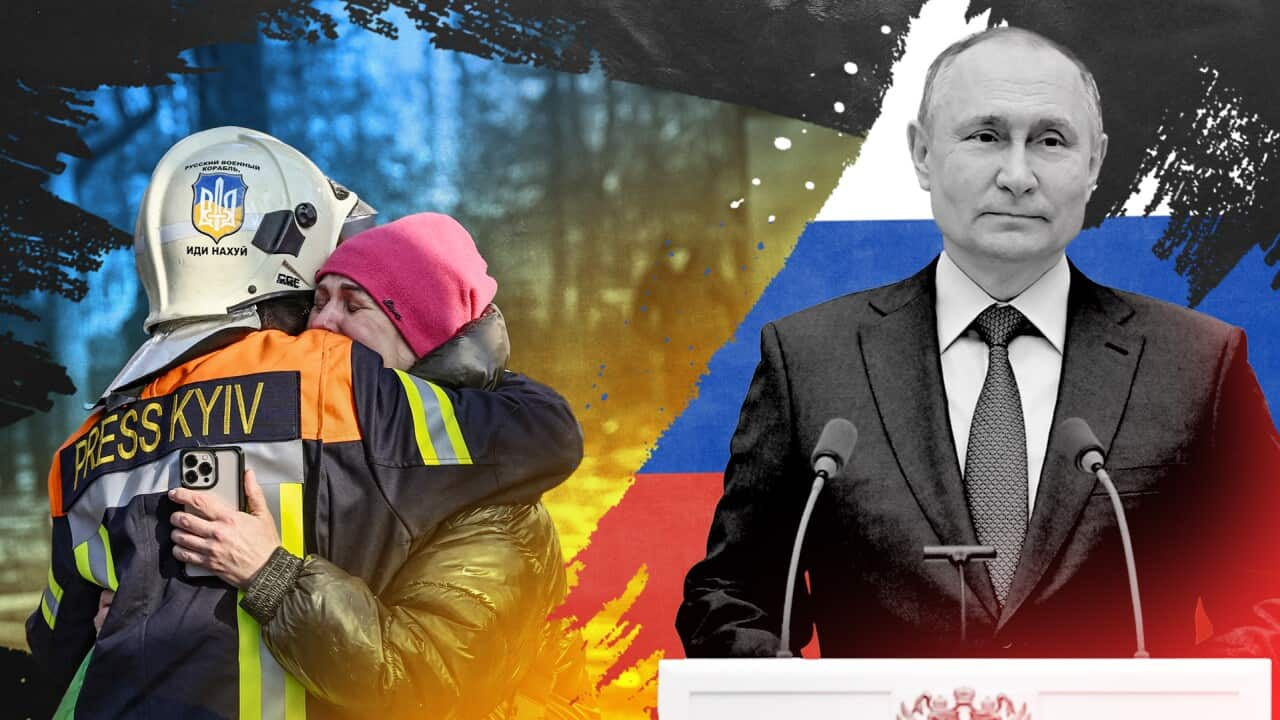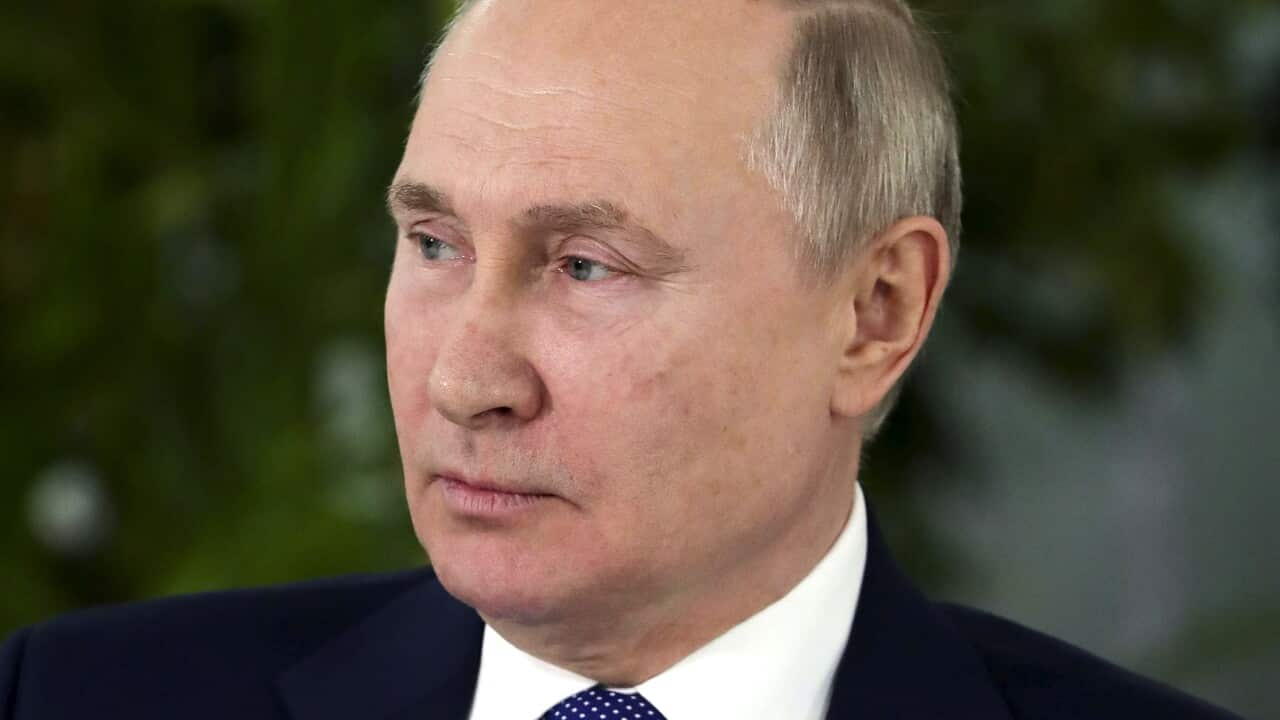NATO is seeking to ramp up military forces on its eastern flank with the alliance's chief, Jens Stoltenberg, warning Russia against using nuclear weapons.
US President Joe Biden flies to Europe on Wednesday for an emergency NATO summit on Ukraine where invading Russian troops are stalled, cities are under bombardment and the besieged port of Mariupol is in flames.
Four weeks into a war that has driven a quarter of Ukraine's 44 million people from their homes, Russia has failed to capture a single major Ukrainian city, while sanctions have ostracised it from the world economy.
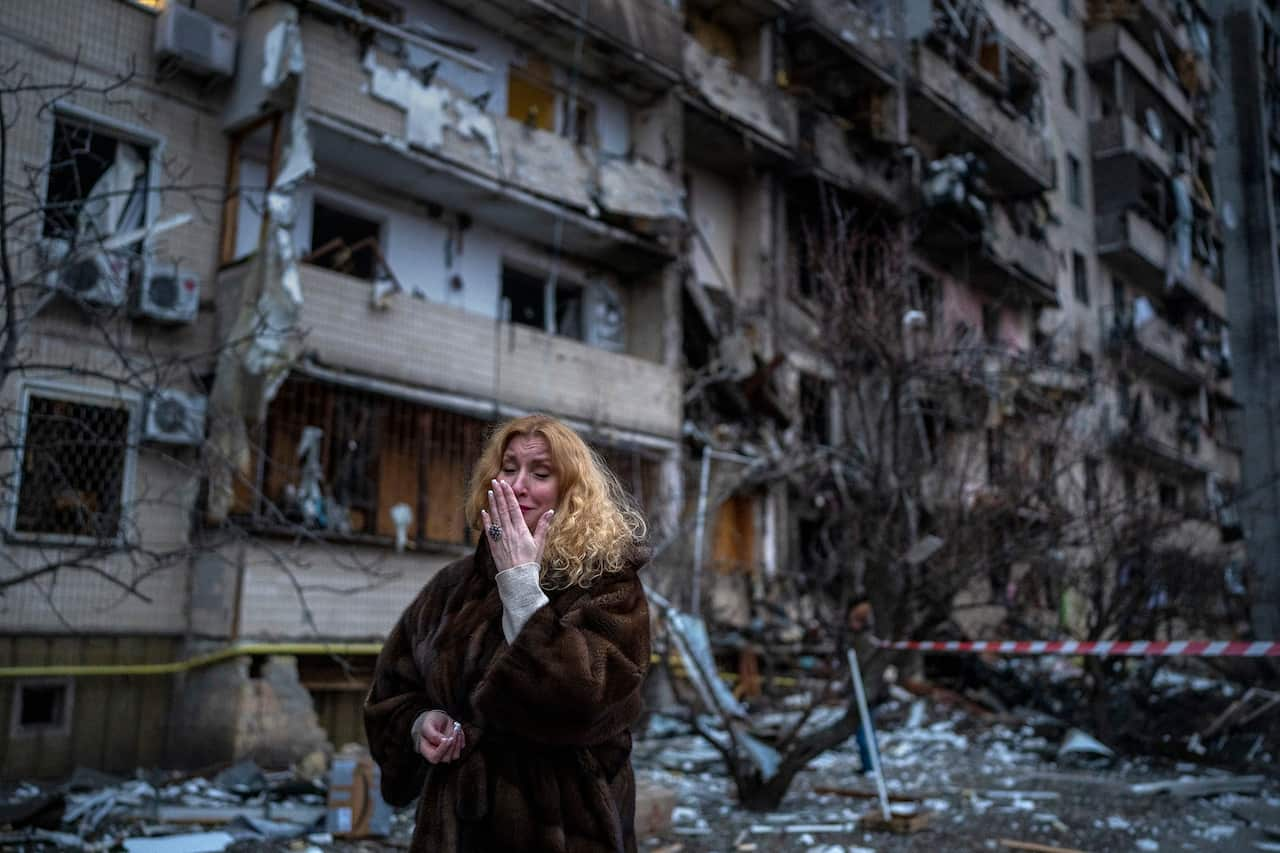
Natali Sevriukova assesses the damage outside her house following a rocket attack in the city of Kyiv, Ukraine. Source: AP / AAP
It denies targeting civilians.
Mr Putin, responding to a welter of Western sanctions that have hit Russia's economy hard and frozen its assets, said Moscow planned to switch its gas sales to "unfriendly" countries to roubles - a move that alarmed international markets.
And in a sign of cracks in Moscow's ranks, a veteran aide to Mr Putin, Anatoly Chubais, resigned over the Ukraine war and has left Russia with no intention to return, two sources said. He was the first senior official to break with the Kremlin since Mr Putin launched his invasion on 24 February.
Although the invasion force has stalled in some areas and Ukrainian resistance has thwarted its hopes for a swift victory, Russian artillery and war planes maintained their bombardments on several cities while civilians sheltered underground.
"I have never seen such cruelty before," said Kateryna Mytkevich, 38, who reached the Polish border transit hub of Przemysl with her child after fleeing the eastern city of Chernihiv. The city was "fully destroyed", she said.
US President Joe Biden was flying to Europe for an emergency summit on Ukraine with NATO and European leaders at the alliance's headquarters in Brussels on Thursday.
The leaders are expected to roll out additional sanctions against Russia. They would also agree to bolster forces on the alliance's eastern flank, NATO secretary-general Jens Stoltenberg told a news conference.
However, Mr Stoltenberg said NATO would not send troops into Ukraine.
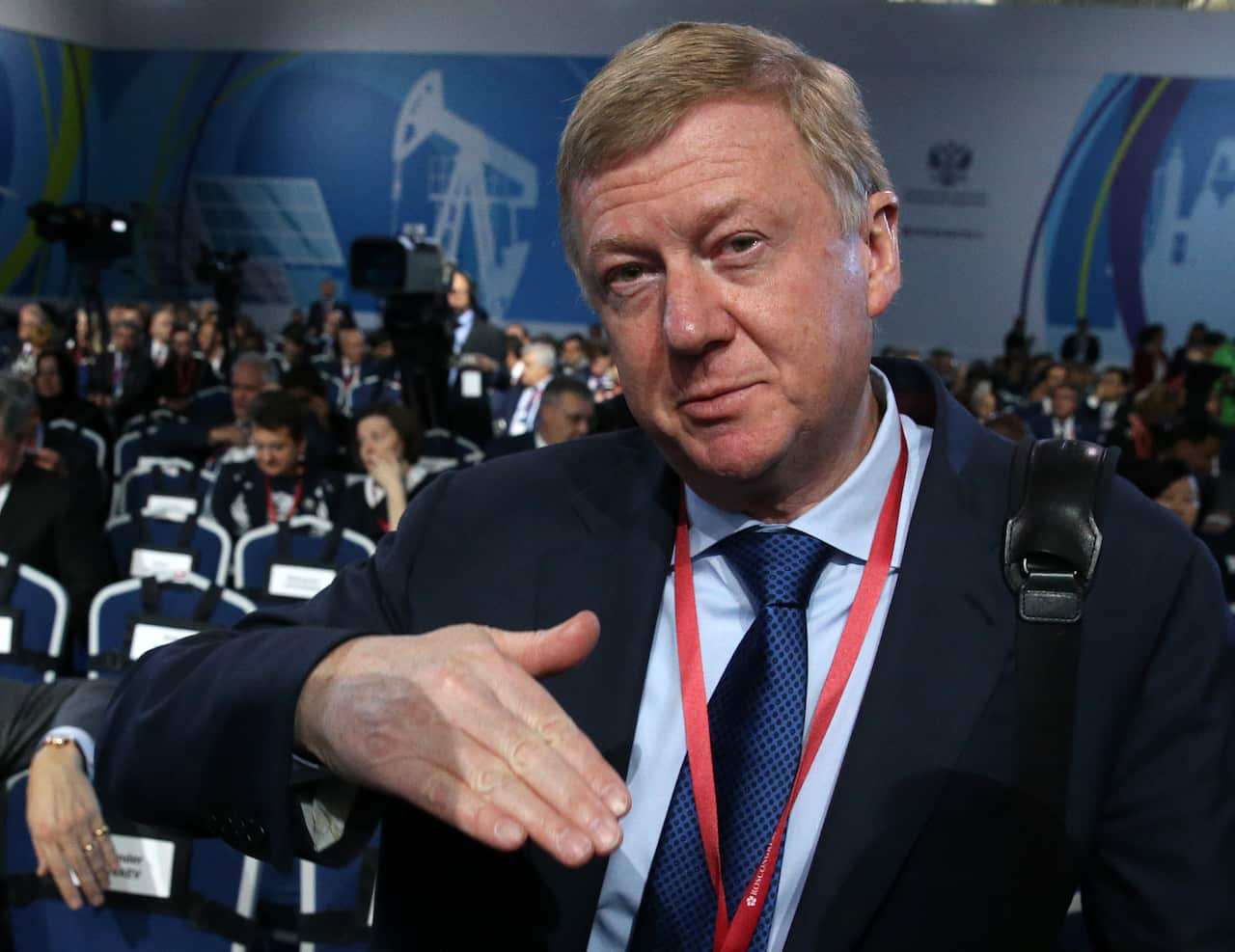
A 2017 picture of Anatoly Chubais, a veteran aide to Russian President Vladimir Putin, who has resigned over the Ukraine war and left Russia. Credit: Mikhail Svetlov/Getty Images
British Prime Minister Boris Johnson told Ukrainian President Volodymyr Zelenskyy in a phone call he would use the meeting to push for an increase in defensive lethal aid to Ukraine, Mr Johnson's office said.
US national security adviser Jake Sullivan said Washington would announce a package of sanctions on political figures and oligarchs. G7 leaders would also agree to coordinate on sanctions enforcement, he said.
'Unfriendly' countries
Mr Putin's announcement that Russia would switch certain gas sales to roubles sent European futures soaring on concerns the switch would exacerbate an energy crunch and jam up deals that run to hundreds of millions of dollars every day.
Russian gas accounts for some 40 per cent of Europe's total gas consumption.
Moscow has drawn up a list of "unfriendly" countries which corresponds to those that imposed sanctions. They include the US, European Union members, Britain and Japan, among others.
Russia would continue to supply natural gas in line with previously concluded contracts, Mr Putin said at a televised meeting with government ministers.
"The changes will only affect the currency of payment, which will be changed to Russian roubles," he said.
Mr Putin sent his troops into Ukraine on 24 February on what he terms a "special military operation" to demilitarise and "denazify" the country. The West says it is a war of aggression aimed at reasserting Russia's sway over the former Soviet republic.
But after a month of bloodshed, Russian forces have failed to capture a single major city in Ukraine.
Although the Kremlin says the operation is going to plan, they have taken heavy losses, got stuck on most fronts, and face supply problems and fierce resistance. They have turned to siege tactics and bombardments, causing huge destruction and many civilian deaths.
The conflict has also driven a quarter of Ukraine's 44 million people from their homes.
Kyiv's mayor, Vitali Klitschko, told reporters on Wednesday that 264 civilians in the city had been killed by Russian attacks. The noise of bombs falling could be heard in the background as he spoke. But Ukrainian forces had retaken the nearby towns of Makariv and Irpin from Russian control, he said.
Mr Klitschko said later that one person was killed and two wounded on Wednesday when shells hit a shopping centre parking lot in a northern part of Kyiv. "The enemy continues to fire at the capital," Mr Klitschko said in an online post.
Russia denies targeting civilians.
Smoke and flames
Worst hit has been Mariupol, a southern port surrounded by Russian forces, where hundreds of thousands of people have been sheltering since the war's early days, under constant bombardment and with food, water and heating supplies cut.
Satellite photographs from commercial firm Maxar showed massive destruction of what was once a city of 400,000 people, with columns of smoke rising from residential apartment buildings in flames.
Despite its losses so far, Russia may still be hoping to make more battlefield gains, especially in the east in territory including Mariupol that Moscow demands Ukraine cede to Russian-backed separatists.
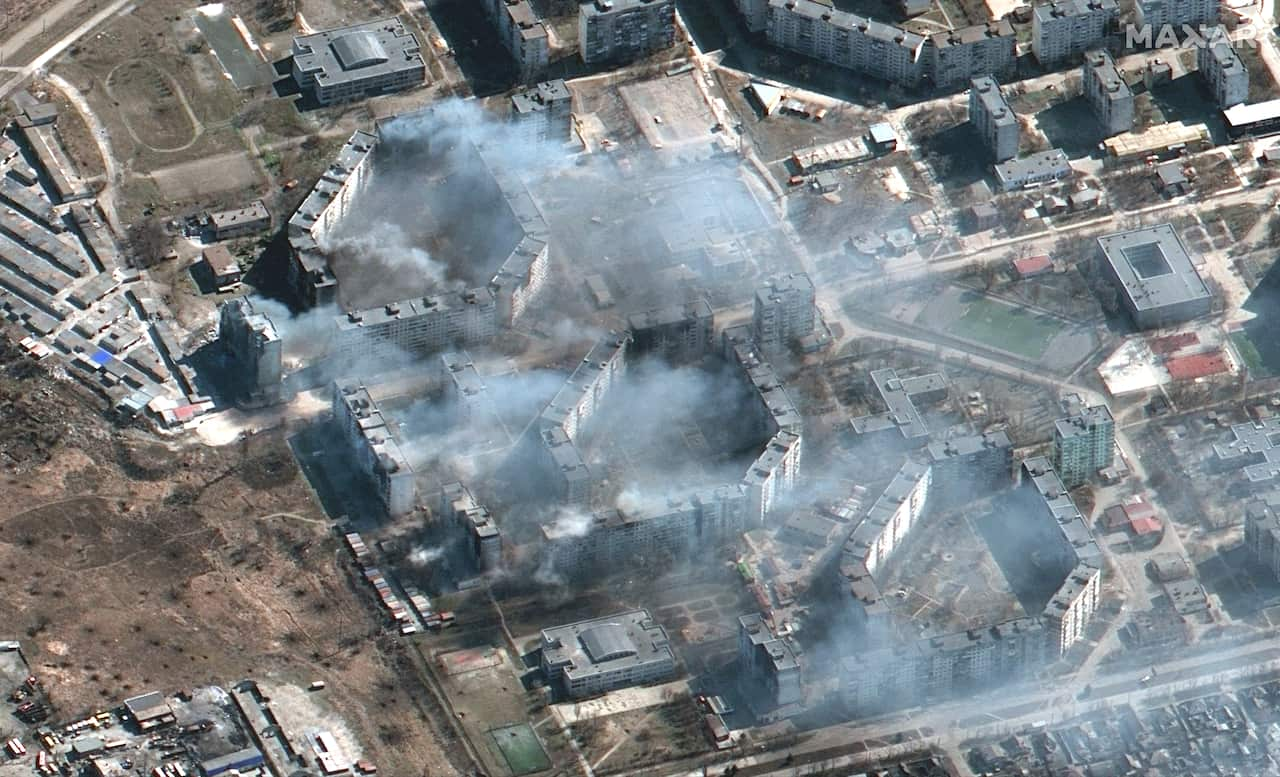
A Maxar satellite image of burning apartment buildings in Mariupol. Credit: Maxar/DigitalGlobe/Getty Images
In the east, the Russians were trying to link troops at Mariupol with those near Kharkiv, Ukraine's second city, in the hope of encircling Ukrainian forces. In the southwest they were bypassing Mykolayiv city to try to advance on Odessa, Ukraine's biggest port, the British report said.
Ukrainian officials described shelling in other cities overnight, with two civilians killed in Mykolayiv region and a bridge destroyed in Chernihiv region. Reuters could not verify these incidents.
Kremlin veteran quits
In Moscow, the Kremlin confirmed that Mr Chubais, the senior aide, had resigned.
Mr Chubais was a principle architect of Boris Yeltsin's economic reforms of the 1990s and was Mr Putin's boss in his first Kremlin job.
He later ran state businesses under Mr Putin and held political jobs, lately serving as Kremlin special envoy to international organisations.
Mr Chubais hung up the phone when contacted by Reuters.

A file photo of Anatoly Chubais during a press conference in Moscow on 23 March 1998. Source: AP / AAP
Many Russians blame Chubais for allowing a small group of tycoons to enrich themselves in the privatisations of the 1990s while millions of Russians were left in poverty amid economic collapse and crisis.
In recent years he continued to call for economic reform and was one of the most high-profile liberals associated with the Russian government.
Russia meanwhile told Washington it would throw out a number of American diplomats in response to a US move to expel Russian staff from the permanent United Nations mission, Interfax news agency said.
Share
